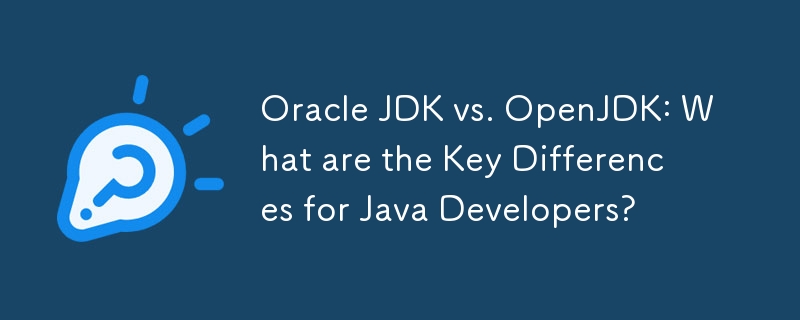Oracle JDK vs. OpenJDK: What are the Key Differences for Java Developers?

Oracle JDK vs OpenJDK: Understanding the Differences
Java developers often encounter the choice between Oracle JDK (Java Development Kit) and OpenJDK when selecting a runtime environment for their applications. While both implementations share a common Java language specification, they exhibit certain distinctions that can impact development and deployment.
Licensing and Support Differences
Traditionally, Oracle JDK embraced a proprietary licensing model, while OpenJDK exists as open-source software under the GPLv2 license. However, starting with Java 11, Oracle requires a commercial license for long-term support of Oracle JDK. This licensing difference introduces an economic consideration for enterprises that rely on extended support.
Codebase Origin and Contributions
Oracle JDK originates and is primarily developed by Oracle, while OpenJDK is a community-driven project with contributions from multiple organizations. This distinction affects the accessibility, customizability, and potential forks of each implementation.
Performance Discrepancies
Both Oracle JDK and OpenJDK strive to meet the Java performance targets. However, the proprietary optimizations incorporated into Oracle JDK's garbage collection algorithms, known as the HotSpot JVM, have historically yielded optimizations in certain workloads. In contrast, OpenJDK relies on a more generic and open-source implementation of garbage collection.
Specific Implementation Variations
Oracle JDK and OpenJDK may also diverge in specific implementation details. For instance, Oracle JDK licenses some Java APIs such as JavaFX and Oracle Collections Framework, whereas OpenJDK provides alternative implementations or relies on third-party libraries. Additionally, platform-specific optimizations within Oracle JDK can differ from those in OpenJDK.
Convergence and Common Ground
Despite these distinctions, efforts have been made to bridge the gap between Oracle JDK and OpenJDK. As of Java 11, major advancements in source code compatibility and improved interoperability have been achieved. This convergence aims to alleviate compatibility issues and streamline development across different Java runtime environments.
The above is the detailed content of Oracle JDK vs. OpenJDK: What are the Key Differences for Java Developers?. For more information, please follow other related articles on the PHP Chinese website!

Hot AI Tools

Undresser.AI Undress
AI-powered app for creating realistic nude photos

AI Clothes Remover
Online AI tool for removing clothes from photos.

Undress AI Tool
Undress images for free

Clothoff.io
AI clothes remover

Video Face Swap
Swap faces in any video effortlessly with our completely free AI face swap tool!

Hot Article

Hot Tools

Notepad++7.3.1
Easy-to-use and free code editor

SublimeText3 Chinese version
Chinese version, very easy to use

Zend Studio 13.0.1
Powerful PHP integrated development environment

Dreamweaver CS6
Visual web development tools

SublimeText3 Mac version
God-level code editing software (SublimeText3)

Hot Topics
 1663
1663
 14
14
 1420
1420
 52
52
 1315
1315
 25
25
 1266
1266
 29
29
 1239
1239
 24
24
 Is the company's security software causing the application to fail to run? How to troubleshoot and solve it?
Apr 19, 2025 pm 04:51 PM
Is the company's security software causing the application to fail to run? How to troubleshoot and solve it?
Apr 19, 2025 pm 04:51 PM
Troubleshooting and solutions to the company's security software that causes some applications to not function properly. Many companies will deploy security software in order to ensure internal network security. ...
 How do I convert names to numbers to implement sorting and maintain consistency in groups?
Apr 19, 2025 pm 11:30 PM
How do I convert names to numbers to implement sorting and maintain consistency in groups?
Apr 19, 2025 pm 11:30 PM
Solutions to convert names to numbers to implement sorting In many application scenarios, users may need to sort in groups, especially in one...
 How to simplify field mapping issues in system docking using MapStruct?
Apr 19, 2025 pm 06:21 PM
How to simplify field mapping issues in system docking using MapStruct?
Apr 19, 2025 pm 06:21 PM
Field mapping processing in system docking often encounters a difficult problem when performing system docking: how to effectively map the interface fields of system A...
 How does IntelliJ IDEA identify the port number of a Spring Boot project without outputting a log?
Apr 19, 2025 pm 11:45 PM
How does IntelliJ IDEA identify the port number of a Spring Boot project without outputting a log?
Apr 19, 2025 pm 11:45 PM
Start Spring using IntelliJIDEAUltimate version...
 How to safely convert Java objects to arrays?
Apr 19, 2025 pm 11:33 PM
How to safely convert Java objects to arrays?
Apr 19, 2025 pm 11:33 PM
Conversion of Java Objects and Arrays: In-depth discussion of the risks and correct methods of cast type conversion Many Java beginners will encounter the conversion of an object into an array...
 How to elegantly obtain entity class variable names to build database query conditions?
Apr 19, 2025 pm 11:42 PM
How to elegantly obtain entity class variable names to build database query conditions?
Apr 19, 2025 pm 11:42 PM
When using MyBatis-Plus or other ORM frameworks for database operations, it is often necessary to construct query conditions based on the attribute name of the entity class. If you manually every time...
 E-commerce platform SKU and SPU database design: How to take into account both user-defined attributes and attributeless products?
Apr 19, 2025 pm 11:27 PM
E-commerce platform SKU and SPU database design: How to take into account both user-defined attributes and attributeless products?
Apr 19, 2025 pm 11:27 PM
Detailed explanation of the design of SKU and SPU tables on e-commerce platforms This article will discuss the database design issues of SKU and SPU in e-commerce platforms, especially how to deal with user-defined sales...
 How to use the Redis cache solution to efficiently realize the requirements of product ranking list?
Apr 19, 2025 pm 11:36 PM
How to use the Redis cache solution to efficiently realize the requirements of product ranking list?
Apr 19, 2025 pm 11:36 PM
How does the Redis caching solution realize the requirements of product ranking list? During the development process, we often need to deal with the requirements of rankings, such as displaying a...




